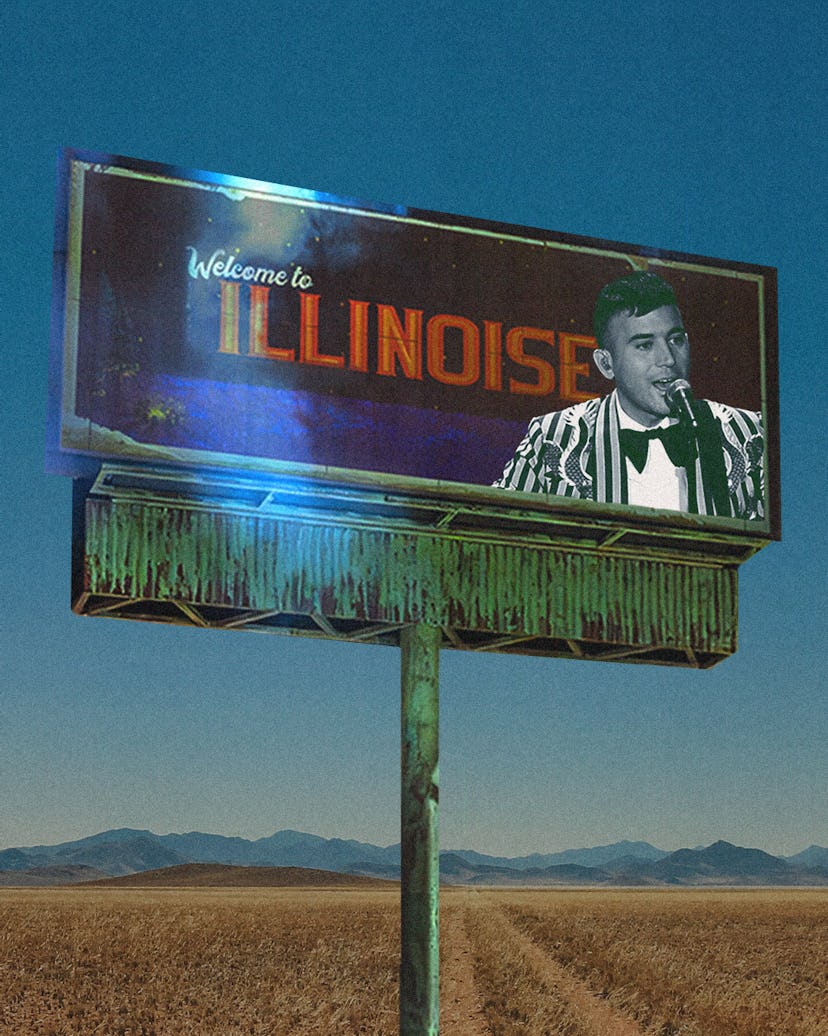Why Illinoise Is Not Your Average Broadway Musical
The Tony-nominated production set to Sufjan Stevens’s music will break your heart without a single word spoken.

Hear the words “Broadway musical” and an image of actors stopping, mid-dialogue, to break into spirited song immediately materializes in the mind. It’s a tried-and-true formula responsible for more than a century of classic art—and typically the type of fare that Tony Awards voters love.
This year, however, brings a change, thanks to Illinoise, one of five productions nominated for Best Musical. Directed and choreographed by choreographer Justin Peck with a story co-authored by Jackie Sibblies Drury, who won a Pulitzer for her 2019 play Fairview, Illinoise is far from the kind of musical traditionally acknowledged in this category. Unlike the productions it’s competing against—including the Alicia Keys jukebox origin story Hell’s Kitchen and the Angelina Jolie-produced stage adaptation of S.E. Hinton’s classic novel The Outsiders—Illinoise doesn’t follow a standard story structure. It privileges dancing over traditional acting, and in its biggest departure, completely forgoes spoken dialogue for its entire 90-minute run time.
Instead, the show, inspired by Sufjan Stevens’s landmark 2005 concept album Illinois, which topped most Best Album lists that year and made superfans of the artist’s already dedicated supporters, plays as more of a narrative dance revue, reimagining some of his most famous songs as a series of interpretative dances.
It’s unlike anything else currently playing, but this bending of the form is a boon, redefining what a musical can be. Despite its lack of a standard plot and dialogue, Illinoise is still grounded in story. This is much to the credit of Stevens, whose music has always had a flair for the dramatic (not least on Illinois, an album that ambitiously sought to capture the essence of an entire state). Paired with the precise choreography of Peck, who has recently branched out from his ballet background to work on films like West Side Story (2021) and Maestro (2023), these narrative-rich songs are given an even more evocative visual dimension.
The production makes use of pretty much every song on Stevens’s album, so of course there are numbers that hit harder than others. Though the dancing is always engaging, it’s hard to be completely enraptured by, say, the very literal depiction of a murderous clown for “John Wayne Gacy, Jr.” or the (similarly literal) undead antics of “They Are Night Zombies!!” when other numbers are nailing bigger creative risks.
But those pieces are just window-dressing for the musical’s main slow-burn throughline, which happens to be one of this Broadway season’s most heartfelt love stories. It begins as a classic triangle, with Henry (show standout Ricky Ubeda) secretly pining for his best friend Carl (Ben Cook), who is straight and in a relationship with Shelby (Gaby Diaz). Ubeda and Cook establish a mesmerizing dynamic of familiar platonic comfort that teeters on the edge of something more. Still, it’s tinged with a sense of looming doom from the get-go. Eventually, tragedy does come, but things quickly change for our main character once he meets Douglas (Ahmad Simmons), with whom he can share a real, loving partnership.
Illinoise takes its time bringing this final pair together, delaying gratification for Henry and the audience. But it’s all in service of this final catharsis, where the show’s story and its dance-forward setup come together. The dancers are tasked with communicating every single emotion through their bodies alone—and the dancing that Ubeda and Simmons do in this last stretch is as transportive as any closing number. It’s joyous and energetic, but also soft and tender. It’ll bring you to tears.
I’ve written about my history with Stevens’s music—how, even before I could be sure that the singer was queer himself, I was able to accept my own queerness through his work. And for previous fans of Stevens, the musical is bound to hold an added resonance; last year, the musician dedicated the release of his tenth album Javelin to Evans Richardson, his “beloved partner and best friend” who died earlier that year at the age of 43. It was the first time the artist had spoken publicly about any of his romantic partners; in turn, it was also the first time he’d ever openly acknowledged his queer sexuality, a bittersweet revelation for those who had speculated for years.
And though Stevens wasn’t directly involved with the creation of Illinoise—the production is inspired by Peck’s “personal and creative journey with Stevens’s album and a long-standing friendship with the artist,” according to a press release—its predominant thread of a young man coming to terms with his sexuality, and coming more alive as a person as a result, feels especially poignant right now.
This has been a solid season for Broadway musicals, and the Tonys have spotlighted some of the best—from the acrobatic splendor of Water for Elephants to the balletic fight choreography of The Outsiders. (Even the straight plays have tapped in: Stereophonic, the buzzy sensation about the infighting of a Fleetwood Mac-like rock band as they try to record their next album, is deservedly nominated for Best Score despite, you know, being a play.)
It’s hard to imagine Illinoise leaving Lincoln Center empty-handed at Sunday’s awards—because of its form, the production is a shoo-in to win Best Choreography. But why shouldn’t its innovation be rewarded in Best Musical, too? After all, musical theater should make you feel something, and Illinoise is easily one of the season’s most overtly sentimental productions. It’s also a love letter to dance’s ability to inspire emotion, to affect its audience through the sheer force of a body’s movement. That, without the crutch of dialogue to tell the audience how they should feel, Illinoise can still evoke tears — of joy, of laughter, of sadness, and eventually, of hope—is an accomplishment to be applauded.
Illinoise is playing at the St. James Theatre on Broadway through August 10.